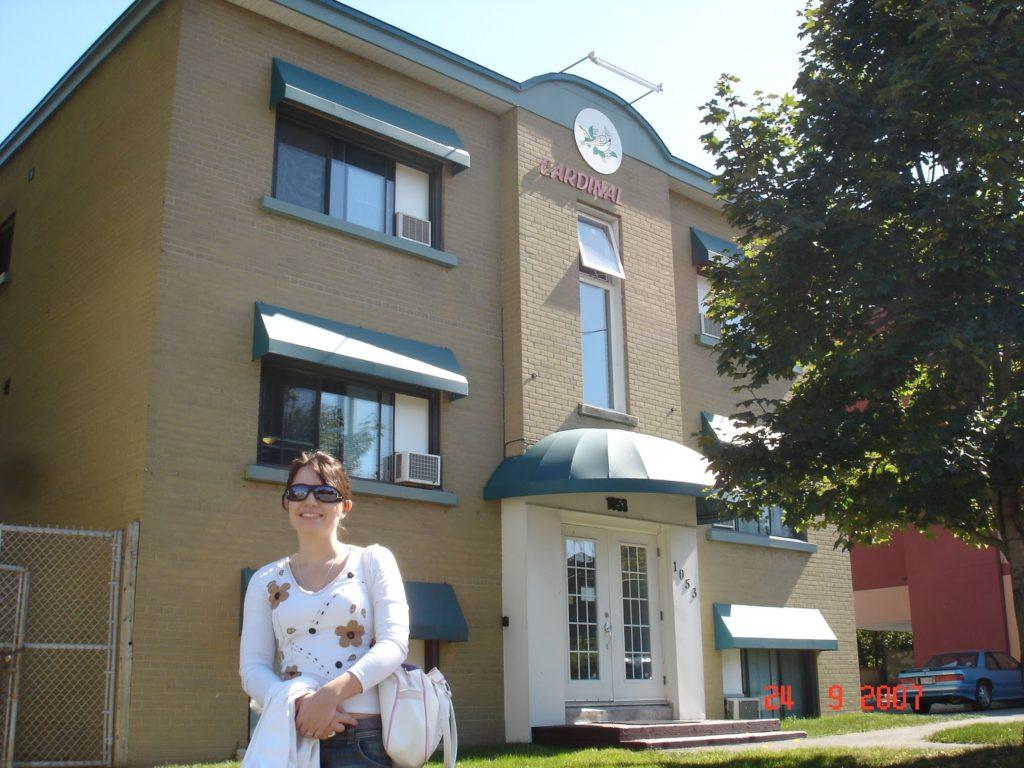The art of immigrating
 |
| At Ottawa airport, the day we arrived as permanent residents in Canada. |
Just like art in other fields, the art of immigrating is yes, in a way, complex and not for everyone.
Today, after basically 9 1/2 years of the moment we became immigrants, I remembered those first days and months when we arrived with so many things to learn and so many uncertainties.
We are with renovation here at home currently and after almost 30 days without stove and 2 weeks camped on the basement floor of the house where the laundry is doing cooking times, we are slowly returning to our normal rhythm. The kitchen here is not yet ready and because of that, I have adapted many of the cooking tasks and such.
I remembered, specifically from the first month and a half, that we stayed in an aparthotel style here in Ottawa, with bedroom, connecting kitchen and bathroom. The kitchen consisted of a small sink, an electric stove, a minibar and a microwave, but I always had to cook the simple things we did supported the small sink of the bathroom, because any steam from the food made the fire alarm of the place. It sounds silly, but these are things I remember to this day, especially with the kitchen here half-finished.
With all this history above, I thought of some key features of who came to the conclusion that wants to change, being to Canada or another country, things that back and forth crosses our conversations with the people who have already gone through this and are here:
1. Viability
I think it's worth putting in the balance the real pros and cons when it comes to making such an important decision. Why it may seem easy to calculate: Canada > world first country > safety > quality of life… compared to Brazil, for example. But not everything is black and white, not everything is an addition or subtraction.
Think about your profession, the costs of validating and being able to pursue your career in the same conditions you are now (and that's possible – there are often times you don't even are).
Think of your family, small or large, and the impact it will make.
Think of everything you need to do to be able to actually change. Dispose of material assets, close accounts in banks, physically distance yourself from friends and family etc.
Think about whether you have the conditions, emotional and financial, to face a few steps back before returning to the path forward.
There are so many things and the ideal is to be honest, for the easy things and the hardest things as well.
2. LANGUAGE AND BUREAUCRACY
Let's say the decision to immigrate was the winner and you seek information. The great thing these days are the inúuumeros blogs, websites and sources of information, immensely more abundant than it was 10 years ago.
And obviously one of the questions that will arise is how to deal with and start the immigration process. I, although this little corner here is little known by the world famous blogger, I get many questions about how to immigrate or how to live in Canada.
And what I always start by saying to people who contact me is check out the Canadian government's immigration website. It seems like the least motivating place to start, but believe me, this is the way. It is bureaucratic and full of steps, but well rewarding if carried out with perseverance.
The site is in English (or French) and there begins the challenge: if you are finding it difficult to understand what is written there, maybe your next step is to study more English, perfect even, because that's the least of the reality around here. It's as simple as that.
3. LABOR MARKET
You can choose to come to Canada for work and see if you like/adapt and then get into the immigration process, but I recommend being realistic about it.
For those who don't know, companies need to sponsor (do the paperwork) for a candidate from outside Canada to come and work here. You can't just apply for a visa and say you're going to come and look for a job.
And Canadian companies suffer some bureaucracies to get someone out, since the Canadian government has protentionist policies, trying to keep vacancies for permanent residents and citizens. I'm no expert in the field, but companies need to post vacancies on various sites throughout Canada for a certain time, demonstrating interest in such a function and if no local candid (country) meet the need for the vacancy and the company proves that it did not find no one here, then yes, can sponsor a job visa applicant.
And I say this, counting that in many areas, it's very difficult not to find someone in the area and the need to hire someone from outside. In the area of technology, it is where we see more cases of work visa and I never knew of anyone being hired in this way in my area (architecture).
Key points (in my modest opinion) to focus on the issue of work in Canada:
- Translate your resume
It seems extremely unnecessary to say this, but there are those who send resumes to companies in Canada in Portuguese! And when I say translate, it's not just using the Google translator and ending this arduous step.. Lol. Canadian standards are other and companies disregard many candidates because resumes are not adequate or do not reflect the things required here. Anyone want to post about it? Let me know.
- Study/search job sites
It won't always be to apply for vacancies, but you can often learn what is currently being required from candidates at your job and/or career level and be better prepared for when your turn arrives.
- Job interviews by phone
These have been very popular around here. Often candidates have multiple interviews before they are hired (it happened to us and it's customary) and usually start by phone.
Now the question you don't want to shut up: are you prepared for a phone interview, efficiently explaining your skills, specific work experiences, and career plans, in English or French only? If you really sell it. For someone who doesn't speak a word in Portuguese (or Spanish) and counting the nervousness factor (and that white man who stubbornly shows up at the most inappropriate hours)?
Simulate with someone who can correct you, because making yourself understand efficiently is essential not only for the job market but for other so many immigrant tasks have to pass at the beginning (seek information, open bank account, get documents, go to doctor's appointments, speak at the child's school or at his or her own school).
Now the question you don't want to shut up: are you prepared for a phone interview, efficiently explaining your skills, specific work experiences, and career plans, in English or French only? If you really sell it. For someone who doesn't speak a word in Portuguese (or Spanish) and counting the nervousness factor (and that white man who stubbornly shows up at the most inappropriate hours)?
Simulate with someone who can correct you, because making yourself understand efficiently is essential not only for the job market but for other so many immigrant tasks have to pass at the beginning (seek information, open bank account, get documents, go to doctor's appointments, speak at the child's school or at his or her own school).
4. DETACHMENT
When we came, we had no home or even home, we had virtually no material belongings or large and rewarding careers. We were not tied to family businesses or businesses the part that brought us income. We didn't have any pets or kids.
I think it was easy for us to change physically. We haven't advanced many steps in adulthood yet and so I think our adaptation was easy.
But that is not the reality of all people or families intending to immigrate. Letting go of home, apartment, belongings, cars and so many other things should be considered in the whole process.
5. Family
There are people who come to Canada having family or close friends already established, but that's not the case with most people who come.
The distance from the family is rather one of the biggest obstacles of every immigrant. You get used to living far away, but it's hard even after many years.
It's worth evaluating if it's something you're prepared to face.
It's worth evaluating if it's something you're prepared to face.
Well, many reflections, I speak again in another post.
Kisses
Kisses





